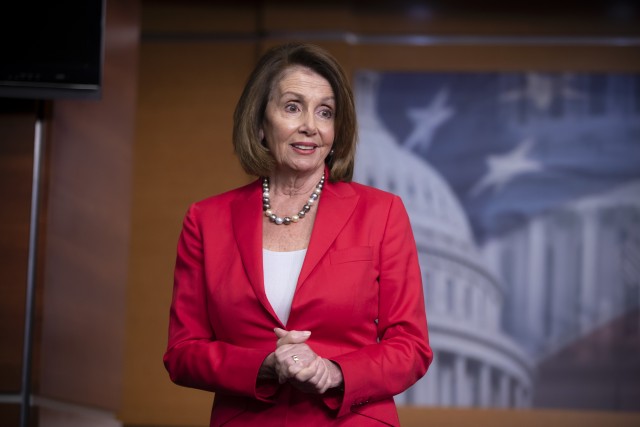Image Credits: AP Photo/J. Scott Applewhite.
It may not be accurate, but many political analysts believe that Donald Trump’s tenuous hold on approval numbers in the low-to-mid forties is reliant on the continued health of the economy. It seems like a sound theory. Trump has occasionally slipped into the high-thirties, so we know that his floor is at least that low. It also appears that good unemployment numbers, a growing stock market, and decent economic growth are his best arguments for reelection. This actually gives the Democrats an incentive to sabotage the economy as the Republicans attempted to do repeatedly during the presidency of Barack Obama. It’s probably only a sense of basic responsibility, one their right-wing colleagues don’t share, that prevents them from welcoming a default on the nation’s debt.
Contrary to their promises, the Republican tax cuts have not generated more tax revenue and the Treasury Department believes that the country could run out of money during Congress’s August recess. This puts Nancy Pelosi in the driver’s seat. She knows that if we default it will kill our credit rating and cause an economic contraction, possibly on a global scale. She also knows who will get blamed most if that happens. It will be Donald Trump, who has few accomplishments aside from the performance of the economy to show the electorate. If she is going to save Trump from defaulting in the next few days before Congress goes home for summer vacation, she expects to get something in return.
House Speaker Nancy Pelosi and Treasury Secretary Steven Mnuchin spoke late Monday as they tried to broker a debt ceiling and budget deal with just days left before Congress plans to leave for the rest of the summer.
The talks took on new urgency after Pelosi shot down a White House fallback plan that would have Congress raise the debt ceiling — potentially for just a short period of time — by late next week if they failed to reach a budget agreement.
Pelosi, the California Democrat, said the idea of raising the debt ceiling on its own and not in conjunction with a budget agreement was not “acceptable to our caucus” and therefore did not stand a chance of passage in the House of Representatives.
She’s demanding a two-year spending agreement and she’s not interested in a short-term fix so they can resume negotiations after Labor Day. This is her hardball negotiating position, but it’s not clear she’ll stick to it. Some people are operating on the assumption that she won’t.
People involved in the negotiations said they were not panicking and that there were still multiple options to avoid a full-blown crisis, and they also said that all sides were working hard to reach a resolution. One option would be for lawmakers and the White House to reach an agreement in principle on the budget before the August recess, temporarily raise the debt ceiling, and then agree on specifics in the intervening months.
There’s little doubt in my mind that a Republican Speaker dealing with a Democratic president would be willing to stick to their guns and get the concessions they demanded. But that would more obviously work because a Democratic president would rather make concessions than risk throwing millions of people out of work. I don’t know for sure that Donald Trump really understands what default would look like and what it would do to his political standing. Pelosi holds his fate in her hands, and he doesn’t like to be in that kind of situation and may just be constitutionally incapable of accepting it as a reality.
It’s dispiriting to see our government once again playing chicken with people’s livelihoods, but this is how we conduct business in Washington, DC these days. Trump has every incentive to do anything he can to convince Pelosi that he’d destroy everything out of stupidity and spite, but her incentives to save him are not political. What’s more, she isn’t a magician who can get her own members to cave to the president on the budget. Even if she gets to a point where she’s willing to blink, her caucus is not likely to follow along. This is especially true because the House Republicans aren’t likely to vote in unison for an agreement no matter what is contained within it. Many of them simply won’t vote to increase the debt limit. This means Pelosi has to convince a large number of her members to vote for the deal.
So, the chances of default are probably higher than they have ever been. The clearest way out is for Trump to capitulate to Pelosi’s demands right now. Do you think he will?
